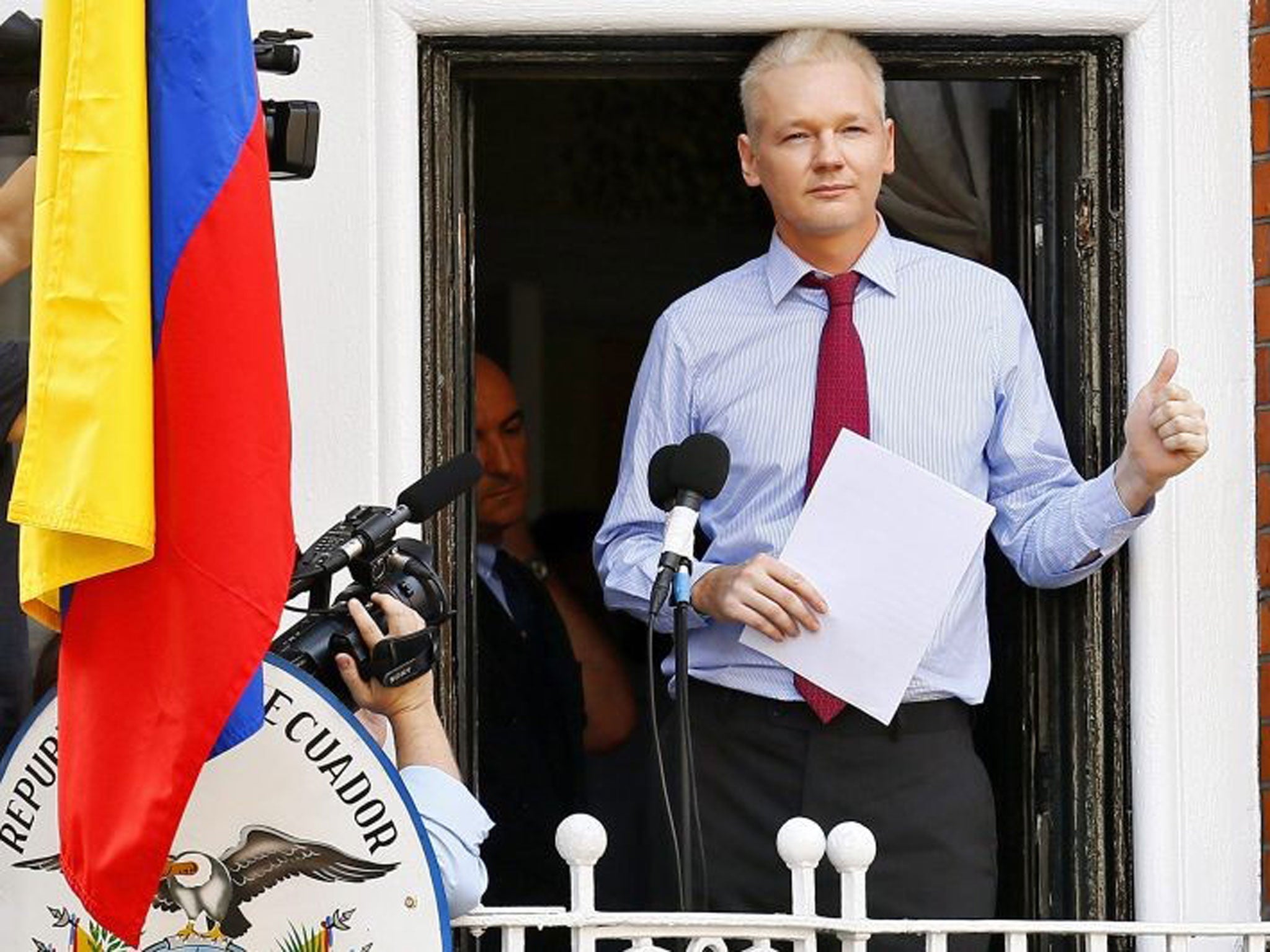Wikileaks founder Julian Assange prepared to stay in Ecuador embassy 'for five years'
Foreign minister says South American country will continue to provide asylum to Australian

Your support helps us to tell the story
From reproductive rights to climate change to Big Tech, The Independent is on the ground when the story is developing. Whether it's investigating the financials of Elon Musk's pro-Trump PAC or producing our latest documentary, 'The A Word', which shines a light on the American women fighting for reproductive rights, we know how important it is to parse out the facts from the messaging.
At such a critical moment in US history, we need reporters on the ground. Your donation allows us to keep sending journalists to speak to both sides of the story.
The Independent is trusted by Americans across the entire political spectrum. And unlike many other quality news outlets, we choose not to lock Americans out of our reporting and analysis with paywalls. We believe quality journalism should be available to everyone, paid for by those who can afford it.
Your support makes all the difference.The Wikileaks anti-secrecy campaigner, Julian Assange, who a year ago avoided extradition to Sweden by moving into Ecuador’s embassy in London, says he’s “strong enough to stay another five years”, according to Ecuador’s foreign minister.
After holding talks with William Hague at the Foreign Office, Ricardo Patino held a briefing for international journalists. He denied Mr Assange’s health was worsening, maintained he was “in good spirits” and confirmed Ecuador will continue to provide political asylum.
A brief meeting between the two foreign ministers produced little change in the legal stalemate that has existed since Mr Assange’s unexpectedly fled to diplomatic safety inside the small Knightsbridge embassy opposite Harrods in June last year.
However both countries have agreed to set up a small group of lawyers, who will meet in both London and Quito, as they seek to find a way out of the stand-off.
No time-limit has put on the working group. Their initial meeting, yet to be arranged, is likely to focus on what Mr Patino called a “South American” view of Mr Assange and his human rights under the United Nations’ charter, and the UK’s belief that it has the right to arrest him outside the embassy under current extradition laws.
The Foreign Office admitted that “no substantive progress” was made in the talks between Mr Hague and Mr Patino and appeared to draw a line in diplomatic sand by saying that any resolution would need to be within UK law.
Mr Patino appeared equally certain that Mr Assange’s human rights to safe passage out of the UK were being violated by an intransigent British government.
The foreign minister, who said he and Mr Assange had talked till 4am in the embassy flat, added : “I would consider it a total injustice if he has to spend more time inside our embassy. It has been a year. I hope he will not grow old and die in our embassy.”
The Wikileaks founder, who oversaw an avalanche of classified diplomatic and military secrets, mainly from the United States, is wanted in Sweden for questioning following allegations made by two women of sexual offences. He has denied the allegations.
Mr Patino said the Ecuador government had offered the Swedish legal authorities the to opportunity question Mr Assange about the allegations in their London embassy. However he said no reply had been made,
Mr Assange has previously claimed that if he was extradited to Sweden, he will subsequently be sent to the United States and potentially face the death penalty relating to charges of disclosing confidential material.
Speaking in Spanish, via a translator, Mr Patino said: "The Ecuadorean government will continue to ensure that he [Assange] continues with the protection we have given him under asylum in our country, protecting his life, his personal integrity, and particularly his freedom of expression.
"The Ecuadorean government maintains that the reasons for which Ecuador granted asylum are still relevant, and therefore there is going to be no change in his circumstances."
The newly-appointed Ecuadorian minister said that although there had been a change of government in his country, the reasons behind the granting of political asylum to Mr Assange had not changed.
He said a document setting out the basis on which Mr Assange should be allowed safe conduct to Ecuador had been given to Mr Hague.
A 24-hour police guard, who have orders to arrest Mr Assange if he steps outside the embassy’s door, is estimated to have cost up to £3m.
Subscribe to Independent Premium to bookmark this article
Want to bookmark your favourite articles and stories to read or reference later? Start your Independent Premium subscription today.
Join our commenting forum
Join thought-provoking conversations, follow other Independent readers and see their replies
Comments